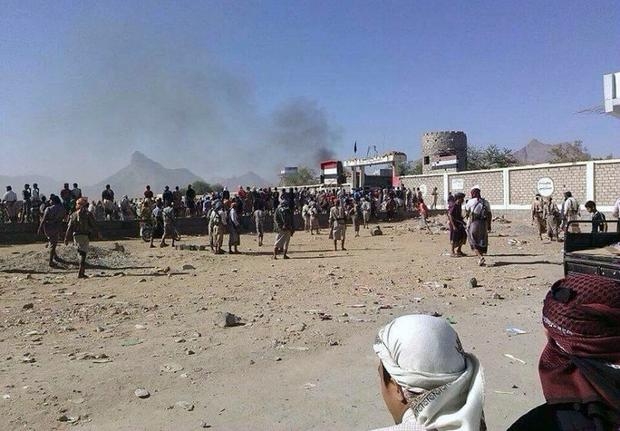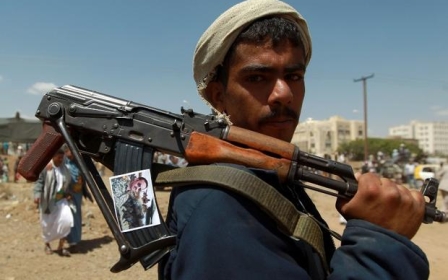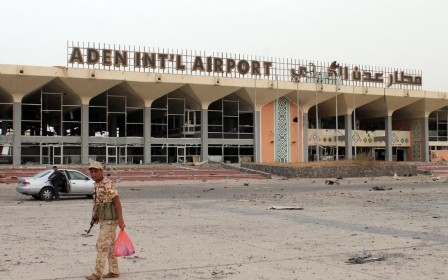Strange bedfellows: Al-Qaeda and anti-Houthi fighters

AL-MUKALLA, Yemen - A heated argument broke out in late March between South Yemen separatists and a group of al-Qaeda fighters as they were battling a Houthi incursion deep within the southern province of Abyan. Not too far from the home village of President Abd Rabbuh Mansour Hadi in the province, the bone of contention between the two militias was the raising of the black al-Qaeda flag and allowing some men who hail from the north to fight in the south.
“We told them that if they want to fight the Houthis in our territories, they cannot raise their flag and send northern fighters to battle the Houthis in the south,” a young Southern fighter from the province of Abyan - who preferred to be called Mohammed to protect his identity - told Middle East Eye.
After swiftly taking control of the capital in September, the Shia Houthi movement pushed in to expand their influence in the Sunni-dominated south, which inspired local people to take up arms to roll back the the Houthi advance. In the south, the Southern Movement (a loose term for factions that call for the revival of the South Yemen state that united with the north in 1990) gained momentum as Houthi military expansion boosted secession sentiment.
Regarding the Houthis as "heretics", al-Qaeda in the Arabian Peninsula (AQAP), the most active branch of al-Qaeda, has also incited members to fight the Houthis' advance across the country. A ruthless air bombing by a Saudi-led coalition on Houthi positions has given anti-Houthi fighters a boost, and has enabled them to take an offensive position since July.
The Yemeni government in Riyadh has either denied or held its peace on media reports that their fighters on the ground are being backed by al-Qaeda militants. But local fighters interviewed by MEE confirmed direct and indirect liaison between the groups.
Mohammed said that al-Qaeda militants largely act on their own in the battlefield and sometimes take the initiative to attack Houthi positions. “They sometimes carry out suicide attacks and set ambushes for the Houthis. We meet in the frontlines.”
The South Yemen separatists asked the militants to lower their flags in order not to be seen by US drones that have been actively operating during the current conflict. Mohammed said that the militants usually do not drive heavy weaponry so as not to be hit by drones.
Mohammed said that the more cautious fighters usually do not mind providing the separatists and other fighters with the heavy arms. “We have taken from them canon and tank shells.”
In early April, al-Qaeda militants stormed the city of Mukalla, the capital of the southeastern province of Hadramout and the fifth most important city in Yemen. The militants faced little resistance as most army troops surrendered or fled. In the following days, the rebels were seen transporting tanks, canons and other arms to the frontlines through neighbouring Shabwa. Al-Qaeda along with conservative Salafi preachers were recruiting and training people in military camps and then sending them to fight the Houthis.
Mohammed said that the militants, who seized billions of Yemeni rials from the Central Bank in Mukalla, are wealthy and sometimes have a great appetite for buying certain kinds of weapons. “They have a lot of money. They recently bought landmines that were abandoned by the Houthis.”
Al-Qaeda militants boast of their active participation in the fighting against Houthis across the country. In a recent YouTube video released by the militants’ media arm, al-Malahem, the field commander of al-Qaeda in Yemen, Jalal Baleedi, said that the militants' arms and money have been a lifeline for many groups of anti-Houthi fighters, adding that they turned Mukalla City into a safe haven for war casualties and displaced people.
“When the mujahidin entered Mukalla, they turned it into a supplier of arms, ammunitions and money,” Baleedi said.
Suspicion
Despite the two groups' unannounced cooperation on the battlefield, a sense of mistrust sometimes springs up. “They are buying and storing arms. We feel that they are preparing themselves for another battle,” another separatist fighter who preferred to be identified as Ali told MEE.
Another cause of mistrust occurred in recent days when the heavily armed Saudi-backed troops marched into Abyan and other provinces in the south. The fighters said that al-Qaeda did not rejoice at the advance of the troops, and rushed to isolate members from the advancing forces. In his video interview, Baleedi said that the coalition forces stepped in when his fighters were making gains on the ground.
Turning point
Both Mohammed and Ali were among hundreds of local fighters who fought alongside government forces in battles against al-Qaeda in 2012. Three months later, the fighters agreed to let bygones be bygones and backed the people who pushed them out of the same province. For some analysts in Yemen, this move heralds a watershed in the militants' ideologies. “For al-Qaeda in Yemen, their number one, two, three and four enemies are Satan, America, Britain and the Houthis respectively,” Saeed Obeid, an independent expert on extremism based in the Yemeni capital told MEE.
During the current conflict, Obeid said, the militants have appeared less inclined to declare their own Islamic emirate and seemed willing to break bread with other Sunni groups who fought them in the past.
“Al-Qaeda’s enthusiastic members have come to the conclusion that they can serve their religion not by declaring a state, but by fighting off the Houthis' expansion with other resistance fighters.”
New MEE newsletter: Jerusalem Dispatch
Sign up to get the latest insights and analysis on Israel-Palestine, alongside Turkey Unpacked and other MEE newsletters
Middle East Eye delivers independent and unrivalled coverage and analysis of the Middle East, North Africa and beyond. To learn more about republishing this content and the associated fees, please fill out this form. More about MEE can be found here.




